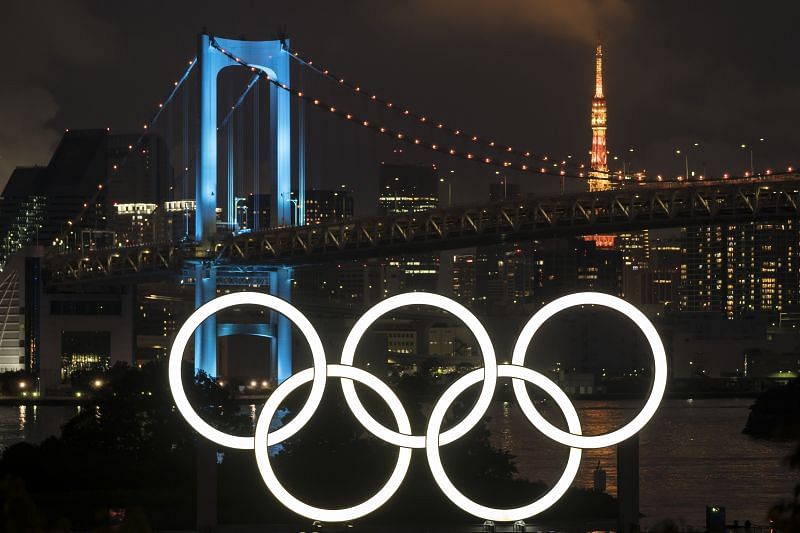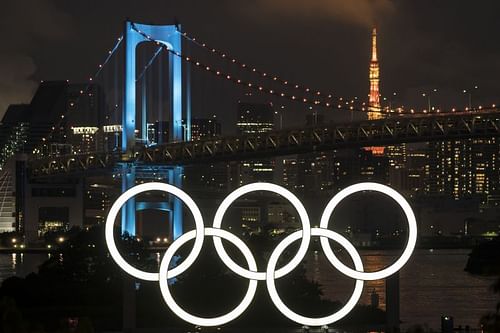
Tokyo Olympics: With 50 days left, a complete timeline of the pandemic-postponed Games

While the world is busy tamping down the spread of the COVID-19 pandemic, the 50-day countdown to the Tokyo Olympics has well and truly begun. The past few months have witnessed a seesawing of headlines about the Tokyo Olympics, amid rising COVID-19 infections in Japan and its variants spreading worldwide.
At this juncture, questions remain as to how a global event of this magnitude can be held in the middle of a ghastly pandemic.
From an unprecedented one-year postponement to barring international athletes from attending the Games, the path to the Tokyo Olympics has been far from smooth. Yet, one year down the line, the fog of uncertainty still looms large over the global sporting showpiece.
Never before had the Olympics been canceled or delayed for reasons other than war, but seldom has the world succumbed to a virus outbreak the way it has now. There were only three instances in the past when the Olympics were canceled, all due to the outbreak of the two World Wars.
Also Read: Tokyo Olympics likely to reignite spread of COVID-19 as reports suggest 79,000 people set to attend event
On that note, let's take a look at a complete timeline of events that has paved the way for the postponement of the Tokyo Olympics.
2013-2016: Japan wins bid, logo believed to be plagiarized
The world erupted in happiness when Japan won the bid to stage the Olympics eight years ago. Tokyo was considered a reliable location, as opposed to other nations with financial strain and political instability.
Many believed the Tokyo Olympics would offer a light of hope to the victims of Japan's deadly 2011 earthquake, tsunami and Fukushima nuclear disaster.
Japan's preparations for the Tokyo Olympics suffered a major embarrassment after organizers scrapped the official logo in the wake of plagiarism allegations against designer Kenjiro Sano. The logo is believed to resemble the emblem of a Belgian theater.
2019 - 2020: Corruption, Tokyo furious over shifting marathon to Sapporo
French magistrates probed corruption allegations against the head of Japan’s Olympic committee with regard to payments totalling $2.3 million made before and after nomination. Although Tsunekazu Takeda claimed his innocence, he stepped down from his position several days later.
In order to avoid the sweltering heat in Tokyo, the International Olympic Committee (IOC) decided to shift the Olympic marathon 800km to northern Sapporo. Tokyo's governor, Yuriko Koike, had subtly expressed her opposition to the IOC's surprise move.
March, 2020: Historic postponement of the Olympics
As the situation in and around Tokyo continued to worsen, the Tokyo officials and the IOC jointly decided to postpone the Tokyo Olympics to one year. A new date was announced for the opening ceremony, but officials stressed it will still be called Tokyo 2020.
They further added that the Tokyo Olympics will not be postponed for a second time in 2021.
December, 2020: Additional costs, new safety measures
The COVID-19 delayed Tokyo Olympics will cost an extra $2.4 billion, organizers confirmed. An additional $1.5 billion will be required for various operational costs caused by the delay. This made the Tokyo Olympics the most expensive Summer Olympics throughout history.
Organizers unveiled plans to host a safe and secure Tokyo Olympics. Athletes will be regularly tested and social distancing protocols will have to be followed. The IOC informed of its decision to ensure participants are vaccinated, adding that jabs will not be obligatory.
January - March, 2021: No respite from the virus in Japan
Japan has declared a state of emergency in Tokyo and other adjoining areas to prevent the resurgence of the COVID-19 virus. As public support started withering away, organizers and the IOC insisted the Tokyo Olympics will be held as planned.
In a major development, Tokyo 2020 chief Yoshiro Mori stepped down from his position after sparking public outrage over his misogynistic comments. He was replaced by athlete-turned-politician Seiko Hashimoto.
In a historic move, organizers announced all international fans will be barred from attending the Tokyo Olympics. This was the first time the Olympics was to be held without international fans. On March 25, the Olympic torch relay kicks off in Fukushima, ending days of speculation and uncertainty.
Also Read: From Serena Williams to Roger Federer, a glance into how Tokyo Olympics uncertainty is affecting athletes
April, 2021: North Korea pulls out of Tokyo Olympics
North Korea became the first country to announce its decision of withdrawal from the Tokyo Olympics. As per media reports, the country claimed its decision was to protect its athletes from contracting the COVID-19 virus in Japan.
May, 2021: 60% votes against the Tokyo Olympics, no 'Black Lives Matter' protest
At a time when Japan is gripped by a fourth wave, nearly 60% of Japanese citizens in an opinion poll wanted the Tokyo Olympics to be canceled. Japan suffered another blow when at least 31 town administrations refused to host foreign athletes for training and cultural exchanges before the Tokyo Olympics.
Meanwhile, the IOC reiterated its earlier decision to ban athletes from engaging in silent acts of protest that promoted the Black Lives Matter movement during the Tokyo Olympics.